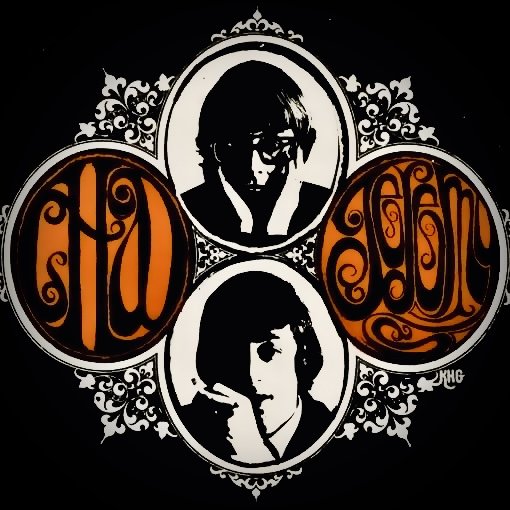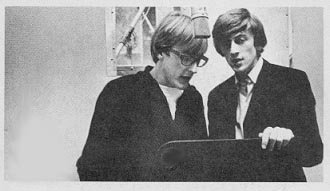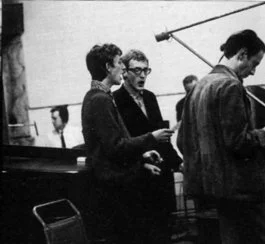Part Two: Fame
1964-1966
Picking up where we left off, C&J were playing at Tina's, a London folk club and coffee bar, and had just been signed to Ember records by John Barry…
The first sessions, produced by John Barry in July 1963, gave the duo their only hit in the UK. "Yesterday's Gone" had been written by Chad about the year before Jeremy's return. He signed the song away to United Artists Publishing, for a £15.00 advance, a move he later came to regret. In the early days of rock 'n roll, however, nobody knew that you could publish your own songs and actually make money. Not even the Beatles themselves could escape exploitative publishing agreements. So just as the Beatles fell victim to bad publishing deals when Brian Epstein signed away the band’s publishing rights to Dick James, so too did Chad & Jeremy.
“Yesterday's Gone” has Wendy Kidd listed as a co-writer, and for this there is a story as well. While Wendy never actually contributed to the song, she was the manager of a band in which Chad played keyboards, and it was on the piano in her London flat that he wrote it. Wendy had gotten Chad a job with a music publisher and in return was given the co-writer credit and half the royalties. At the time, it appeared to be a pretty fair and harmless trade-off; he never imagined that that very song would ultimately soar up the American charts!
Shortly after its September 27th, 1963 release, the single reached number forty in the UK. charts- no mean feat for a first waxing. The duo then returned to the studio to record a follow up single, “Like I Love You Today,” released in January 1964.
By now, Chad and Jeremy had moved on from Tina's to a residency at Hatchett's, then a West End cabaret landmark. None other than Gordon & Peter, as they were then billed, took over their noon spot at Tina’s. “Like I Love You Today” failed to make any real impact on the UK charts, however, and John Barry, disillusioned with Ember's inability to compete with the major labels, bought himself out of his contract- effectively leaving C&J to sink or swim. He felt so guilty about leaving the guys in the lurch that he later made a present to Jeremy of a very impressive stereo system. Chad recalled ruefully, “I was living in California at the time and I didn't get anything!”
So began a run of bad luck in the UK. Matters were made worse when early in 1964 The Daily Express published a picture of a young Jeremy Clyde all dressed up in velvet as a page to his grandfather at Queen Elizabeth's coronation in 1952. This may seem fascinating and newsworthy to Americans, who have always been somewhat in awe of royalty, but in England it essentially branded Chad & Jeremy as upper-class twits who had no right to play in the working class rock ‘n roll playground. The two disagree on exactly how the picture reached the hands of the press. Chad remembers that the paper simply dug it out of their files, but Jeremy has a different recollection - he believes the photo was intentionally sent to the press!
“I was very embarrassed about it at the time, but Tony Lewis, our manager, decided that any publicity was good publicity, and I was kind of forced to go along with it. I actually think it was the wrong thing to do.”
Meanwhile, the American market, untouchable when the first single was recorded, opened up like a floodgate in the Spring of 1964. A new label out of Pittsburgh called World Artists heard the first single and bought the US rights to C&J. They quickly released "Yesterday's Gone," and, quite unexpectedly, it began to head up the charts- the Country charts, that is! But, as Jeremy is quick to point out, this success would be short-lived, “Once they discovered that we were English and we had hair, that was the end of that!”
Fortunately, the record also picked up steam on the Pop charts, partially due to the fact that World Artists decided to take on the challenge of making C&J 'the' hit artists on their roster and devoted all their time and financial resources to promoting it. Ironically, as Chad noted years later, had the single ended up in the hands of a major label, they most likely would not have gone to such extremes to get a hit. World Artists, who were hungry for a hit, were willing to do whatever it took to get one. And they did. By May of 1964, it had gone Top Twenty.
The activities of World Artists were actually unknown to the duo, and news of their achievement came as a surprise. Jeremy remembers his shock in finding out that the record was a hit, “We got this telegram, which said, ‘Congratulations, boys. You're sixty-five in the American charts with a bullet’...and we didn't even know that we had a record released, much less a hit or anything like that!”
Back in the UK, Ember was unwilling to spend any money on any further recording sessions, but C&J were a hit in the American market and it was time for an LP. World Artists was in the odd position of creating masters for the record company they were merely licensing C&J from. The duo was turned over to producer Shel Talmy, who would produce the bulk of their first album, called Yesterday’s Gone. This album contained a track which was overlooked at first, a ballad called "A Summer Song." Little did they know that it would one day reach the American top ten.
In August of 1964, “A Summer Song” was issued as a follow up to “Yesterday’s Gone,” giving C&J their second, and biggest, US hit. World Artists quickly altered the cover of the Yesterday's Gone album to indicate the inclusion of their new single. It sold like hot cakes. In November of that year, “Willow Weep for Me” became C&J’s third stateside hit. C&J was gaining undeniable traction in the US, and that year the duo made the decision to move to California. Chad, Jeremy, as well as Jill, now Chad’s wife, went.
Although musically the duo were becoming successful, problems continued on the administrative end of things.
Issues with royalty payments and conflict between Ember records and World Artists persisted and were a major source of dissatisfaction, and it was under these tense circumstances that Chad & Jeremy went into the studio once more. This next set of recordings was produced in New York City by Jimmy Haskell. Chad remembered Jimmy as “a lovely man,” but perhaps too easy-going to deal with the behind-the-scenes conflicts at the time. Chad and Jeremy, now with their careers completely based in the US market, also had increasing reservations about both Ember, their UK label, and World Artists, their US licensee and during these Haskell sessions, put into motion a plan to leave the Ember/World Artists situation behind.
After a crisis meeting with the top brass at William Morris Agency, one agent suggested that they meet with Allen Klein, the same one who would go on to manage nearly every British act of any significance and become so infamous. “This guy was basically pimping for Allen,” Chad recalled of the agent, “and of course we fell for it.” Before long, in what Chad once described as “a ballet of shady moves,” Chad and Jeremy signed with Columbia Records. In order to sign with Columbia, however, they would have to buy out the rest of their contract with Ember, costing them half of their Columbia advance. Chad & Jeremy were free of Ember Records- at great expense.
Moving to Columbia marked a shift in the Chad & Jeremy sound. On March 1st, 1965, the official start date of the Columbia deal, C&J were in Columbia's New York studios with Lor Crane, beginning the Before and After sessions. The title song became a big hit, and clearly delineated the “new” C&J from the “old” sound of the World Artists era. Meanwhile, their old label released the final records of the “old” sound, releasing “What Do You Want With Me” (later re-recorded for the first Columbia LP), “My Coloring Book,” and “September in the Rain” throughout the first half of 1965.
On April 25th, 1964, Chad & Jeremy had made their first American TV appearance on The Hollywood Palace variety show. In addition to their move to Columbia records soon after, this appearance became instrumental to their rapidly growing success. This marked a turning point in their careers. In the audience that day was William Morris agent John Hartman. He promptly signed the duo and proceeded to book them on comedy shows and sit-coms. John Hartman was the elder brother of comedian Phil Hartman, and he went on to fame and fortune as the manager of Poco, America, and Crosby, Stills & Nash. C&J were featured on The Dick Van Dyke Show and The Patty Duke Show in early 1965, and then, as the Columbia material began to appear, they were all over TV with appearances on shows such as The Andy Williams Show, The Danny Kaye Show, Shindig, and Hullabaloo. Between Columbia's clout and the hit making abilities of the group and their producers, it was now clearer than ever that Chad and Jeremy were big-time artists.
The beginning of the Columbia era was ironically almost the end of Chad and Jeremy, as conflicts between Chad the full-time musician and Jeremy the actor began to emerge. In fact, one winter morning on New York's 6th Avenue, on the way to sign the Columbia contract, Jeremy had second thoughts about the effect the long-term music deal would have on his ability to act. Chad, with visions of dollar signs floating in his eyes, managed to talk Jeremy into signing on the dotted line, but this incident foreshadowed problems to come. In Jeremy's defense, their sudden success had given him little time to try to find a balance between his musical hobby and acting, which remained his true love.
Reconciling Jeremy’s dueling interests in acting and music became increasingly difficult as the duo’s success grew. Chad & Jeremy were now mounting massive tours of the United States, crisscrossing the country and playing in towns and cities everywhere. It was a demanding schedule, and Chad, fatigued from touring, fell ill with mononucleosis. While Chad was laid up in bed for several months in the spring of 1965, Jeremy was offered a part in a John Barry musical in London, entitled Passion Flower Hotel, a play which he describes as “a gracious, genteel bust!” The role required a nine month commitment. To try and preserve their momentum, once he was recovered, Columbia records sent Chad into the studio on his own to record a handful of songs and complete the I Don’t Want to Lose You Baby LP. It was released in the autumn of 1965.
Balancing Jeremy’s music and acting careers was unsustainable and things became bad. In early July of 1965, Chad and Jeremy's guest shot on the Merv Griffin Show was billed as their final appearance - anywhere. For Jeremy, there was really no reason to not take the part - Chad was still recovering from mono and unable to tour, and with an entire LP laid down, there was no recording to do. One problem did arise when Jeremy, due to his commitment to Passion Flower Hotel, was forced to back out of a July concert at McCormick Place in Chicago at the last second. Left with no alternative because of Jeremy's absence, Chad actually walked out on stage with a cardboard cutout of Jeremy under his arm and proceeded to put on a Chad & Jill concert! Jill, recollecting the event, said “I felt sorry for Chad out there all alone and volunteered to join him… but when I got out there and saw 5,000 pairs of eyes looking at me, I almost went into shock.” In the end, overcome by stage fright, she did “I Got You Babe,” and made a quick exit.
By the time the I Don't Want To Lose You Baby LP was released in the fall of 1965, Jeremy was in London, while Chad, after a brief return to London, stayed in the states, recording with his wife Jill. “The Cruel War” sessions with Jill began on October 21st. During Jeremy's stay in London, which lasted until February of 1966, he recorded his own solo single, produced by John Barry, with a 'rocked up' version of his song from Passion Flower Hotel, “I Love My Love,” backed with his own composition, “Anytime,” which would later be remade as a C&J track- though it would languish in the vaults for a quarter century after its recording!
By late 1965, Chad and Jeremy were doing interviews on both sides of the Atlantic in order to answer questions about their “temporary separation,” and to reassure fans that they would record together again. In a late-October interview for KYA radio in San Francisco, Chad explained, “We're in the middle of a turmoil; this doesn't mean that Chad and Jeremy have gone bust or anything. I think we've got to be very honest with everybody about our problems, and that is this problem of being a musician and an actor, and the actor wanting to act and the musician wanting to 'musish'!” It was clear that some balance would have to be found in the future, and thankfully, several opportunities in 1966 would alleviate some of this tension.
For all practical purposes, C&J were broken up during the Fall of 1965. As to motives behind “The Cruel War,” Chad explains that Jill was included because “I thought I needed to go out there with someone,” but in hindsight, “It really wasn't fair to expect her to do that.” The song, an elaborate reworking of a previous release by Peter, Paul & Mary, sounded quite excellent, and Columbia had high hopes for it. They took out full page ads in Cashbox and Billboard. This didn't save the single, however, because Peter, Paul and Mary quickly re-released their own version and a battle of the singles ensued. Chad & Jill's first and only outing would stall at number one hundred and ten in early 1966. A year later, in a mock interview, Jeremy asked Chad if he would ever sing with Jill again. “Only in the shower!” was Chad's quick retort.








